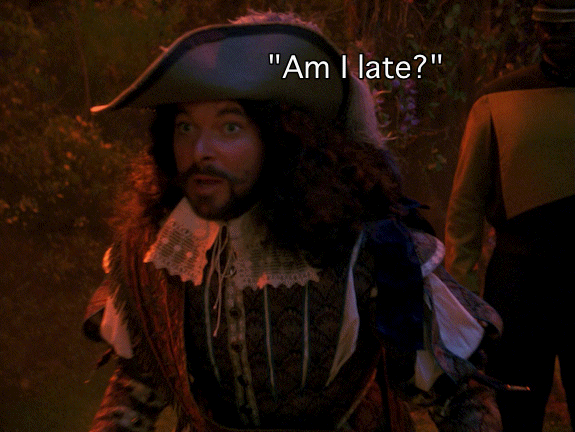


Season 3 as a whole may not have fired on all cylinders, but so far it's certainly done a better job than the first two seasons of TNG by having smarter, more interesting stories and allowing our main characters to be more likable (despite Gene's best efforts). One thing that Season 3 does more effectively then its previous seasons is establish a ton of material that will go on to have relevance later in the franchise. And that's really about the size of it. Things we're shown in this season will be later expanded upon in later seasons of not only TNG, but in other Star Trek shows as well. "Hollow Pursuits" happens to be one of those episodes that introduces us to Reginald Barclay, a shy, isolated and nervous individual. Dwight Schultz impressed everyone with his portrayal of Barclay so much that he would continue to make appearances in TNG as well as being mentioned in Deep Space Nine, numerous appearances in Voyager and even appears in the feature film Star Trek: First Contact.
Our episode begins with Barclay in Ten Forward pushing Geordi over a chair and giving Riker a serious case of "Surprise! _____". It all turns out to be a holographic recreation of the characters and once Barclay leaves this fantasy, he's quite nervous and shy around everyone else. And Riker... Oh, Riker. For a character who has had good moments of command competence and sometimes being a moral booster, he sure jumps into a condescending jerk in this one. The way he talks down about Barclay in front of everyone, mocking Troi when she's bothered by her "goddess" rendition, and following Wesley's rude example in calling Barkley "Broccoli" to everyone, INCLUDING THE CAPTAIN! Really puts that whole "enlightened humanity" message of Star Trek on display, doesn't it?
It's interesting to note that since this episode's release, there has been some backlash about the depiction of Barcley. Specifically, being depicted as a "stereotypical" Star Trek fan. I can sort of see how some viewers would think that, but personally, I don't really see it. Barclay doesn't come off as some desperate fan boy who wants to be with his heroes. On the contrary. The Enterprise is still the flag sip of the fleet and he actually has a hard time working with others. He's just a guy who is burdened with his job and uses the holodeck as a means of escaping reality. And I think this episode plays that theme very well.
One area I'll give this episode credit for is that it doesn't look at Barclay's situation and comes up with an absolute solution by saying escaping into fantasy is bad. It strikes a balance between the two. That scene where he says his goodbyes to the crew on the bridge is a nice moment because it's a bait and switch. It's not the real crew, it's the ones he recreated for his fantasy. And when he orders the computer to erase all his programs, he finishes the episode with,
BARCLAY: ...except program nine.
And that's it. Barclay hasn't completely gotten rid of his fantasy escapism because he doesn't need that level of escapism anymore. He helped save the day on the Enterprise and he's now more open to the crew, as they are to him. And I just like that bit where he says "except for program nine" because at first it makes you think what could that program be, and than realize that everyone needs their own personal little escape from reality, and that's all that matters.
CONCLUSION:
While it's slightly above average, it's nice that we're at least introduced to a character who will be reoccurring throughout the series so it doesn't feel like a complete waste of time. And whatever you might think of Barclay, putting Wesley in such a laughable position in his own fantasy can't make him all that bad. As I mentioned before, I'm really glad this episode didn't go the "Fantasy is not real! Stop escaping to it!" route the way I was expecting. Everyone has their own ways of escaping reality, and if it starts to become a problem, you can work it out without completely eliminating it.
STINGER:

Last edited:

